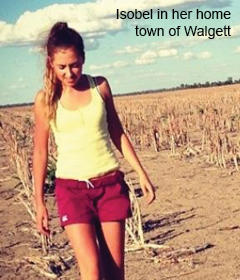Scholarship helps Isobel bring medical expertise to rural NSW
Isobel is an aspiring dermatologist, final-year UNSW Medicine student and a recipient of the President & Vice-Chancellor’s Equity Scholarship.
The scholarship, made possible through the generosity of our alumni community, has allowed Isobel to not only achieve her dream of studying medicine, but also enabled her to gain valuable experience in research and practice instead of spending her free time holding down a job.
Coming from the small town of Walgett in rural New South Wales, Isobel has experienced firsthand the medical challenges of rural communities, where healthcare is not always readily accessible. Through her studies, Isobel plans to bring much needed medical expertise to NSW’s rural communities.
How has the scholarship impacted your studies at UNSW?
Coming to UNSW, I felt like a very small fish in a very large sea. When I got to UNSW I didn’t even know how to live in Sydney! I had to navigate my way around all of that while also getting enough study time to keep my grades up.
I managed to do it, but I know it was a lot harder for some of my colleagues who were trying to juggle the same things as me, plus casual employment on top. The scholarship alleviated that extra pressure of work for me, it meant that I was able to enjoy my learning and also say yes to opportunities that would give me hands-on experience in my field - opportunities like volunteering with St John’s Ambulance and helping to treat real patients, observe research and care being done by other dermatologists, and so on.
Education is important, but getting access to it isn’t always easy. Only 9.5% of UNSW students are from low socio-economic backgrounds, and only 1 in 5 students are from rural or remote areas. The challenge isn’t just getting into university, but staying there. The living expenses and study costs of attending university are considerable, and worsened for those who need to move away from home to study. With access to financial assistance, these students have a stronger chance of completing their degrees.
Why did you study medicine?
 I grew up in a town called Walgett, which is about a nine hour drive north west NSW, almost near the Queensland border. There was only one GP in town and they shared their time between us and six other towns. I grew up thinking that it was normal to have no doctors around – you saw the doctor when he or she was available, as opposed to when you actually needed to.
I grew up in a town called Walgett, which is about a nine hour drive north west NSW, almost near the Queensland border. There was only one GP in town and they shared their time between us and six other towns. I grew up thinking that it was normal to have no doctors around – you saw the doctor when he or she was available, as opposed to when you actually needed to.
I love living in the bush, and I’d like to use my career to do something that would help a lot of people that I know have really struggled with getting help for their medical needs. There is a real need for dermatologists, especially in rural areas. In Sydney you can wait up to a year to see a dermatologist, but in the bush it’s more like two or three years. People in the country have such high sun exposure but they have the least number of dermatologists around – that’s why I want to get out there and help out where people are at higher risk.
My grandfather died of melanoma and my mum was also diagnosed with it, so the impact of the sun is very dear to my heart. Dermatology is a very specialised field so I wouldn’t necessarily work in Walgett, but I want to work somewhere rural to help those communities out for sure.
What would you say to anyone considering supporting this scholarship?
I would tell them “thank you”, and also let them know how important it is. We medicine students like to push ourselves hard and we like to do well - this scholarship opened opportunities for me to do just that. It allowed me to really love studying medicine, and really enjoy what I do.

If you are a graduate of UNSW, an enthusiastic student ambassador will be reaching out to you in the coming weeks as part of the UNSW Impact Appeal.
Please consider supporting Equity Scholarships for UNSW students who are experiencing disadvantage, in the hope that everyone has the opportunities they deserve regardless of circumstance.








